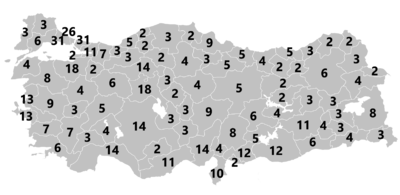
Elections in Turkey are held for six functions of government: presidential elections (national), parliamentary elections (national), municipality mayors (local), district mayors (local), provincial or municipal council members (local) and muhtars (local). Apart from elections, referendums are also held occasionally.

General elections were held in Turkey on 22 July 2007 to elect 550 members to the Grand National Assembly. Originally scheduled for November, the elections were brought forward after parliament failed to elect a new president to replace Ahmet Necdet Sezer. The result was a resounding victory for the incumbent Justice and Development Party (AKP), which won 46.6% of the vote and 341 seats. The party's leader Recep Tayyip Erdoğan was consequently re-elected as Prime Minister of Turkey. The opposition Republican People's Party (CHP) came second with 20.9% of the vote and took 112 seats. The Nationalist Movement Party (MHP), which had failed to surpass the 10% election threshold in the 2002 election, re-entered parliament with 14.3% of the vote and 71 MPs. The election was fought mostly on Turkey's debate over laïcité that had been perceived to be under threat from the AKP's nomination of Foreign Minister Abdullah Gül, an Islamist politician, for the Presidency. Developments in Iraq, secular and religious concerns, the intervention of the military in political issues, European Union membership negotiations, the United States and the Muslim world were other main issues.

Presidential elections were held in Turkey on 10 August 2014 in order to elect the 12th President. Prime Minister Recep Tayyip Erdoğan was elected outright with an absolute majority of the vote in the first round, making a scheduled run-off for 24 August unnecessary.
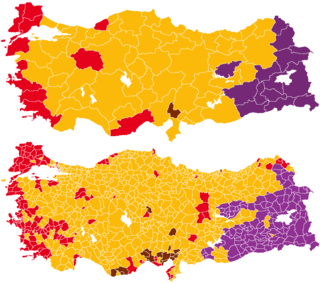
General elections were held in Turkey on 7 June 2015 to elect 550 members to the Grand National Assembly. This was the 24th general election in the history of the Turkish Republic, electing the country's 25th Parliament. The result was the first hung parliament since the 1999 general elections. Unsuccessful attempts to form a coalition government resulted in a snap general election being called for November 2015.

Local elections were held in Turkey on 30 March 2014, with some repeated on 1 June 2014. Metropolitan and district mayors as well as their municipal council members in cities, and muhtars and "elderly councils" in rural areas were elected. In light of the controversy around the elections, it was viewed as a referendum on the government of Prime Minister Recep Tayyip Erdoğan. About 50 million people were eligible to vote.

The 2003 by-election in the Province of Siirt was held on 9 March 2003 in order to elect three Members of Parliament from the eastern Turkish province of Siirt to the Grand National Assembly of Turkey. The by-election was held four months after the 2002 general election in November, which the Supreme Electoral Council of Turkey declared null and void in Siirt due to voting irregularities in the district of Pervari. The council decided on 2 December 2002 that the complaints by the local electoral authorities had influenced on the election result, thus calling a by-election.
In the run-up to the Turkish general election of June 2015, many political parties engaged in campaign efforts to increase their vote shares. The main contesting parties were the governing incumbent Justice and Development Party (AKP) led by Ahmet Davutoğlu, the Republican People's Party (CHP) led by Kemal Kılıçdaroğlu, the Nationalist Movement Party (MHP) led by Devlet Bahçeli and the Peoples' Democratic Party (HDP) co-led by Selahattin Demirtaş and Figen Yüksekdağ. These four parties are the only parties with a realistic chance of surpassing the 10% parliamentary threshold to gain representation in the Grand National Assembly of Turkey
In the run-up to, during and after the Turkish general election of June 2015, numerous accusations of electoral fraud and violence were made by opposition parties. Electoral fraud in Turkey has usually been most extensive during local elections, where individual votes have significantly larger impact in determining local administrations. Although the 2014 presidential election saw little evidence of electoral misconduct, issues regarding voter records as well as extensive media bias have been controversial issues that have remained largely unaddressed. In both the local and presidential elections in 2014, several voters reported that ballot papers had been sent to addresses that are wrong or do not exist as well as voters that have been dead for a substantial amount of time.
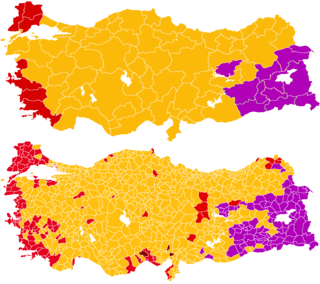
General elections were held in Turkey on 1 November 2015 to elect 550 members to the Grand National Assembly. They were the 25th general elections in the History of the Republic of Turkey and elected the country's 26th Parliament. The election resulted in the Justice and Development Party (AKP) regaining a parliamentary majority following a 'shock' victory, having lost it five months earlier in the June 2015 general elections.

The Labour, Democracy and Freedom Bloc was an electoral alliance formed by the pro-Kurdish Peace and Democracy Party (BDP) with several other smaller left-wing parties and political movements in Turkey. The alliance contested the 2011 general election by fielding candidates from participating parties as independents in order to bypass the 10% election threshold needed to win seats in the Turkish Grand National Assembly. The alliance won 5.67% of the vote, initially winning 36 MPs. The Supreme Electoral Council of Turkey later annulled the election of BDP MP Hatip Dicle in Diyarbakır, reducing the alliance's elected MPs to 35. The Bloc fielded 65 candidates in 41 provinces.

Ayşe Gülsün Bilgehan is a Turkish politician from the Republican People's Party (CHP), who has served as the Member of Parliament for Ankara's first electoral district since 2015. She previously served as an MP for the same district from 2002 to 2007 and served as an MP for Ankara's second electoral district from 2011 to 2015. She is the granddaughter of İsmet İnönü, the second President of Turkey. Between 2010 and 2011, she served as a Deputy Leader of the CHP. She was offered, but declined, a ministerial position by Prime Minister Ahmet Davutoğlu during the formation of an interim election government in August 2015.

The Republican People's Party election campaign of June 2015 was the election campaign of the Republican People's Party (CHP), the main opposition political party in Turkey. The campaign, which was mainly centred on the slogan Yaşanacak Bir Türkiye, was for the June 2015 general election. Before the election, the CHP had signed a deal with the American election strategy firm Beneson Strategy Group to assist with the campaign.

Parliamentary elections were held in Turkey on 14 May 2023, alongside presidential elections, to elect all 600 members of the Grand National Assembly. The incoming members formed the 28th Parliament of Turkey. The elections had originally been scheduled to take place on June 18, but the government moved them forward by a month to avoid coinciding with the university exams, the Hajj pilgrimage and the start of the summer holidays. Prior to the election, the electoral threshold for a party to enter parliament was lowered from 10% to 7% by the ruling party.

Ali Haydar Hakverdi is a Turkish politician from the Republican People's Party (CHP) who currently serves as the Member of Parliament for Ankara's first electoral district since 7 June 2015. He was first elected in the June 2015 general election and was re-elected in the snap election of November 2015.

The Turkish local elections of 2019 were held on Sunday 31 March 2019 throughout the 81 provinces of Turkey. A total of 30 metropolitan and 1,351 district municipal mayors, alongside 1,251 provincial and 20,500 municipal councillors were elected, in addition to numerous local non-partisan positions such as neighbourhood wardens (muhtars) and elderly people's councils.

Presidential elections were held in Turkey on 24 June 2018 as part of the 2018 general election, alongside parliamentary elections on the same day. They were the first presidential elections held after constitutional amendments were approved in a 2017 referendum.
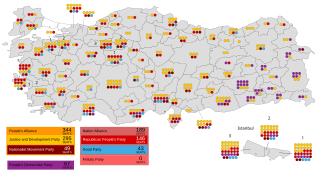
Parliamentary elections were held in Turkey on 24 June 2018 as part of general elections, with presidential elections taking place on the same day. Originally scheduled for 27 October 2019, President Recep Tayyip Erdoğan called snap elections on 18 April after months of speculation. With the passage of a series of constitutional amendments in the 2017 referendum, the number of MPs will be increased from the previous 550 to 600. These representatives will be elected by the constituents of the 87 electoral districts of Turkey by party-list proportional representation.

The March 2019 Istanbul mayoral election took place on 31 March 2019, as part of the 2019 Turkish local elections. In addition to a mayor for the Istanbul Metropolitan Municipality, all 39 Istanbul districts elected their own individual mayors as well as district councillors.

The June 2019 Istanbul mayoral election was held on 23 June 2019. It was a repeat of the March 2019 mayoral election, which was annulled by the Supreme Electoral Council (YSK) on 6 May 2019. The original election had resulted in a narrow 0.2% margin of victory for opposition candidate Ekrem İmamoğlu, causing the governing Justice and Development Party to successfully petition for a by-election.
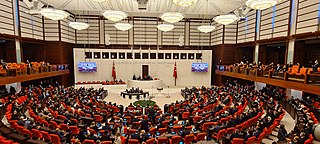
Parliamentary elections in Turkey determine the composition of the Grand National Assembly for the next five years. The members are elected for a five-year term through a proportional system in 87 multi-member constituencies with closed party lists or as independent candidates.



